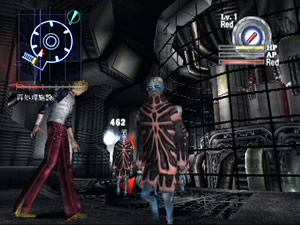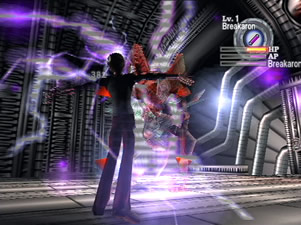Ash and burn.
When will people learn not to let computers run their lives? No, I’m not talking
about digital organizers and e-mail. I’m talking about the threat of supercomputers
like this one.
In the original Galerians,
the supercomputer Dorothy was a friendly caretaker, handling the mundane ins
and outs of her human masters. But like every supercomputer before her that
was given too much power, Dorothy went nuts and decided to screw over humanity.
Unlike
Skynet,
Dorothy decided to take her time and dabble in some genetics, creating her own
race of species, the Galerians. These genetic mutations had great psychic powers
and were meant to bring about the end of mankind. That is, until Rion, a psychically
gifted young boy, was able to stop her. And that was the end of that… or was
it?
Supercomputers aren’t morons (or else they’d just be averagecomputers). There’s
always a contingency plan. When Dorothy fell, Plan B went into effect. It seems
not all of the Galerians had been eliminated. The Last Galerians were unleashed
to devastate the world and resurrect their “mother.”
Galerians: Ash, the sequel to Galerians, brings us back to the
drugs and genetic manipulation in the post-apocalyptic world of the original.
Drawing heavily on the anime Akira, the game begins with a retread, pedaling
backwards to the conclusion of the first game. It’s a clever (albeit drawn out)
way to set up the new story. From there, though, Galerians: Ash loses
steam and winds up doing no justice to its merely decent predecessor.
While the story has some interesting points and the CG movies are notable,
the translation and dialogue is terrible, with boring and at times indecipherable
speech. Supercomputers and disembodied voices simply have to learn to e-nun-ciate.
The style has switched from the fixed camera of the original into a behind-the-back
third-person action game. Controls have also switched from the old Resident
Evil style to a more pleasant character-centric style, but the jerky and
easily waylaid camera is awful, lacking a separate independent control.
In between the difficult bosses and trying to find hard-to-locate interactive
objects, Rion will spend much of his time wandering around. At first, there’s
an eerie sense of danger to it, but then you realize it’s just plain wandering
because nobody is going to attack Rion.
Rion is a pill popper, gleefully ingesting drugs like jelly beans. But these aren’t your garden variety Tylenols. They come in multiple colors, each “flavor” offering a different attack.
 Unfortunately,
Unfortunately,
whoever built this combat system was probably on drugs as well. Before attacking,
you must wait for the drug to kick in. While you’re charging up, you are completely
vulnerable. It’s a highly restrictive and unsatisfying combat system, forcing
you to run from enemies, leave enough room to charge up, lock on, and then fire.
Even simple defensive maneuvers such as blocking have a painful lag.
Whenever Rion uses a psychic attack, it causes his body to stress out, increasing his ‘Addiction Points’ (AP) meter. If his AP gets filled, Rion suffers from a massive headache that will cause enemies around him to spontaneously combust. At the same time, Rion’s own life meter will steadily wear down.
If I’ve learned one thing from prescription drug commercials, it’s that the
best way to fight one drug is with another drug. Rion must take the drug Delmetor
in order to return to normal. Sadly, Delmetor is harder to find than a Quaalude.
At times, the lack of Delmetor can be far too frustrating. Despite the “survival
horror” of item conservation, the game’s emphasis on action requires more items
to appear. But you never have enough, and it gets irritating.
In the original Galerians, Rion resembled an 11 year-old girl. Six
years into the future, Rion still looks like an 11-year old girl, only
taller with maroon hip huggers. It looks like he’s some kind of awkward pubescent
as he runs about. Generally speaking, the visuals of the game look sharply dated.
The sterile environments and jagged lines of Galerians: Ash disavows
the sense of imminent, horrific danger introduced in the original.
The voice acting, when ungarbled, is fine. Otherwise, the sound is pretty bland.
Despite its attempts at better action and control, Galerians: Ash falls
far short of matching the flawed original. What it has gained in control it
has lost in style and pacing. Maybe it should have taken one last cue from Akira
and been a movie or a comic book instead.

-
Good CG movies
-
Better control than original
-
Worse everything else
-
Bad combat pill system
-
Too much wandering about
-
Monotonous item hunting
-
Dumb camera







